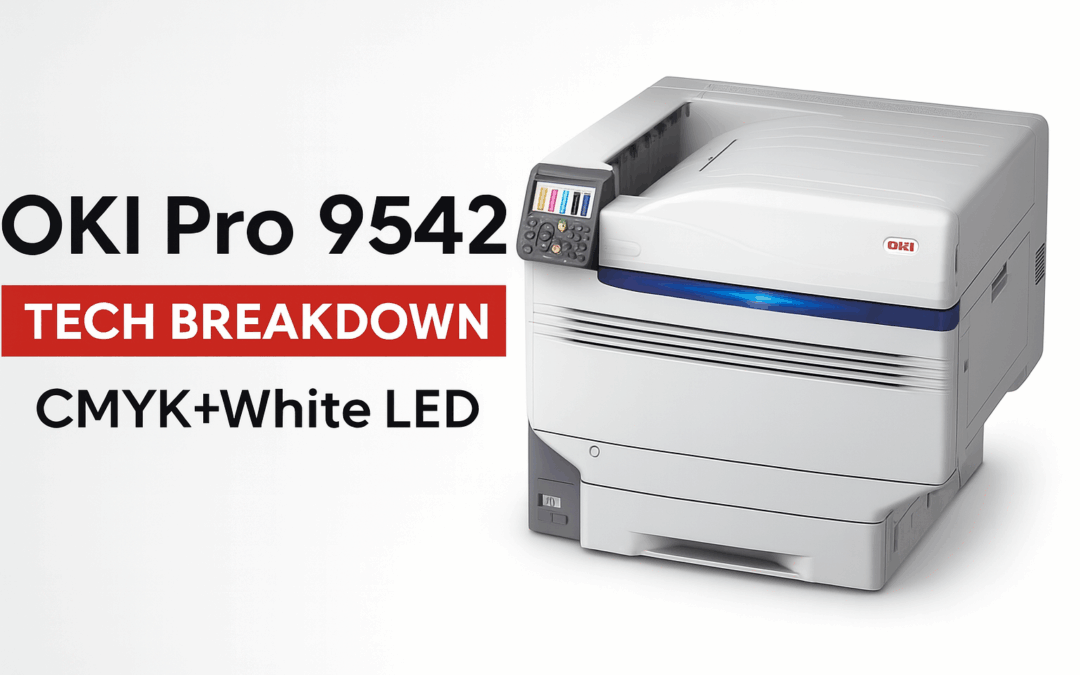OKI Pro 9542 Tech Breakdown: CMYK + White LED Power for In-House Graphic Arts
A practical, engineering-level walkthrough of how the OKI Pro 9542 produces high-impact colour on challenging stocks using single-pass CMYK + White, plus what that means for speed, coverage, media flexibility and total job cost.
True 5-Colour Engine
- White under/over for dark, coloured and transparent media.
- High-density solids with crisp micro-text and fine lines.
Digital LED Imaging
- LED arrays deliver precise dot placement and reliable registration.
- Fewer moving parts vs laser = robust uptime and lower maintenance.
Banner & Specialty Media
- Long-sheet banners (up to ~1.3 m) and heavy stocks (up to ~360 gsm*).
- Envelopes, labels, packaging mock-ups and polyester films.
Production Efficiency
- Single-pass colour with white saves passes and operator time.
- Near-instant fusing warm-up helps short-run responsiveness.
How CMYK + White Works (Layering Diagram)
Separate artwork into CMYK plus a spot white plate (underprint, overprint or both).
Digital LED arrays expose each station with extremely fine control for dot gain and edges.
White is laid down as an opaque base (under) or as a highlight (over) to pop colour on dark or clear stock.
Colour sits above white for accurate brand tones and vivid contrast.
Optimised heat/pressure profiles bond toner to coated and uncoated stocks with durable finish.
Technical Considerations for Best Results
RIP & File Prep
- Define a spot colour named White for under/over layers; keep vector text as vectors where possible.
- For transparent media, use a flood underprint + choke to prevent halos on tight edges.
Fusing & Stock
- Select the closest media profile (weight/surface) to ensure correct fusing and gloss level.
- Heavier media may require reduced speed and elevated fuser temperature for bond strength.
Registration & Duplex
- Use alignment calibration for white-to-colour registration on intricate graphics.
- For duplex with white, test sequence (W→CMYK) on side 2 to avoid scuffing.
At-a-Glance Specifications*
| Print Technology | Digital LED, 5-station (CMYK + White) |
|---|---|
| Resolution (class) | Up to 1200 × 1200 dpi-class imaging |
| Max Media Weight | Up to ~360 gsm (profile dependent) |
| Max Banner Length | Up to ~1300 mm (long-sheet) |
| Typical Use Cases | Packaging mock-ups, decals, clear & coloured stock, envelopes, POS, labels |
| White Usage Modes | Underprint (base), Overprint (highlight), Spot/Selective |
*Always verify exact specifications with the latest OKI documentation for your model and region.
Where the OKI Pro 9542 Shines
Short-run speciality work is where the Pro 9542 pays for itself—no plates, rapid changeovers, and white in the same pass. Typical wins include small packaging runs, prototype labels, and high-margin point-of-sale where dark or transparent stocks are specified.
- Consolidate outsourced white-toner jobs to reclaim margin.
- Offer same-day turnarounds on niche media your competitors avoid.
- Reduce labour: single-pass white + colour equals fewer re-feeds and less waste.
FAQ: OKI Pro 9542 Tech Breakdown
Do I need special artwork for white?
Yes. Create a dedicated spot plate named White. Your RIP maps this to the white station as an underprint, overprint or both. For edge fidelity, apply a slight choke on the white base beneath CMYK.
Can it print on textured or synthetic stocks?
It supports a wide range of coated, uncoated and synthetic media. For heavily textured or slick synthetics, test and tune fuser temperature/speed and choose the closest media profile for reliable adhesion.
How does digital LED differ from laser?
LED arrays expose the image linearly without moving mirrors. You get precise registration, fewer moving parts, and consistent edge acuity—great for micro-text, barcodes and fine packaging details.
Want help configuring media profiles, RIP white workflows or estimating job cost on the OKI Pro 9542? sales@rgbuk.com · 01189 344426

